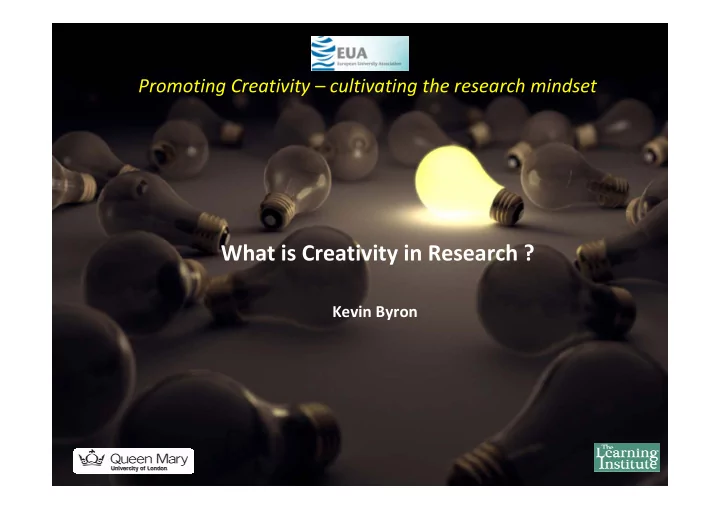

Promoting Creativity – cultivating the research mindset What is Creativity in Research ? Kevin Byron
http://www.vitae.ac.uk/
What is Creativity in Research ? • Defining Creativity • How Research Progresses • Creativity Tools and Techniques
What is Creativity ? Ideas that are original and useful . A novel and appropriate response to an open ‐ ended challenge or problem. • Imagination • Intuition • Ingenuity • Insight • Inspiration Research Student Regulations and Handbook: “To be admitted to the degree of Doctor of Philosophy a candidate shall have presented a thesis on the advanced study and research which has satisfied the examiners and contains original work, and contains material which is deemed worthy of publication, and ……………”
‘C’ and ‘C’ Creativity ! Creativity in Research ?
How Research Progresses Next Development Maturity Creative Steps Progress Delays Competing Setbacks theories Rapid Infancy Development Effort (Time)
Challenges in Developing a Climate of Creativity and Innovation “We must no longer wait for tomorrow ‐ it has to be invented” ‐ Gaston Berger “Tomorrow is not what it used to be !” ‐ Paul Valery Progress Knowledge Exchange Effort (Time) • Nurture a Creative and Entrepreneurial Mindset • Reduce Delays: (1) Incubation (Creativity) (2) Research & Enterprise Management (Innovation Process)
Insight Delay 1: The End Gain
Insight Delay 2: The child in the crowd ! “Why didn’t I think of that ?”
Insight Delay 3: Realising the potential of new discoveries The Discovery of Buckminsterfullerine (Buckyballs)
Convergent Thinking Thinking Styles Divergent Thinking
Osborn–Parnes Creative Problem Solving (CPS) C C o o n n v v e e Diverge r r Diverge g g e e 2 3 1 Fact Fact Objective Objective Problem Problem Finding Finding Finding Finding Finding Finding Diverge Diverge Converge Converge C C o o n n v v Diverge e Diverge e r r g g 5 6 4 e e Idea Solution Acceptance Finding Finding Finding Diverge Diverge Converge Converge Steps Stages 1 - 3 Identifying and Clarifying the Challenge 4 - 5 Finding Ideas and Evaluating them 6 Putting the Solutions into Action
Idea Finding – Transformation Creativity ? “The transformation of conceptual spaces” (Boden)
Transformation • Ask “ What if ?” Substitute Combine Adapt Modify (Magnify/Minify/Multiply) Put to other uses Eliminate Reverse
SCAMPER prompts SUBSTITUTE What can be substituted? MODIFY Who else? What if I change the colour, shape, form, scent, Can the rules be changed? sound, movement? Other Ingredients, Material? What if I scale up the idea/object? Oher processes or procedures? What if I scale down the idea/object? Other Place? What if I multiply it? Other Approach? What else instead? What changes can I make further up/down the COMBINE system? What ideas can be combined? What can be modified? What about combining units or departments? PUT TO OTHER USES What materials can be combined? What else can this be used for? What methods could be combined? What else could be done with this? What tasks can be combined? ELIMINATE What procedures could be combined? What should I omit? What functions could be combined? Should I divide it? What could be included with this idea? Should I separate it? What about a blend, mixture or assortment? Streamline? Miniaturise? ADAPT Subtract? Delete? Remove? What else is like this? What’s unnecessary? What other ideas does this suggest? REVERSE Does the past offer a parallel? What if I turn it inside out? How do I adapt it for a different customer? What if I do the opposite? How do I adapt it to a different market? What if I reverse roles? What could be copied? What if I work backwards? Whom could I emulate? What are the negatives? What else could be adapted? What different contexts can I put my concept in? What ideas outside my field could I incorporate?
“Chance Favours ‘The Prepared Mind ’” Louis Pasteur New ideas arise through asking the right questions and adopting a creative attitude. The right question arises through asking many questions and this process can be assisted with the appropriate use of technology.
Conclusion Improvements in the development of the three ‘master’ skills of creativity, critical thinking and influence are essential for developing the next generation of researchers. Their future careers are set against a backdrop of economic turbulence, an increasing demand for capabilities in these skills in the private sector, a growing requirement to demonstrate impact beyond publications with their research and a career trajectory that is unpredictable and short ‐ term.
Recommend
More recommend